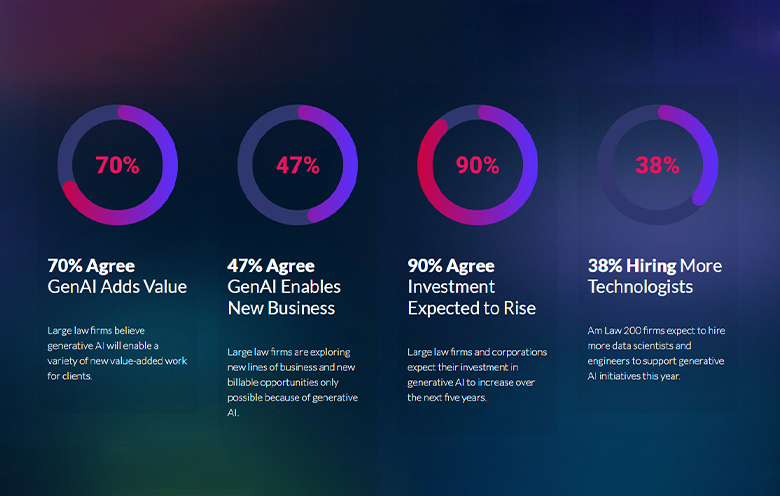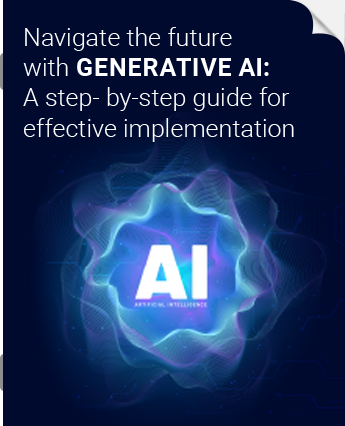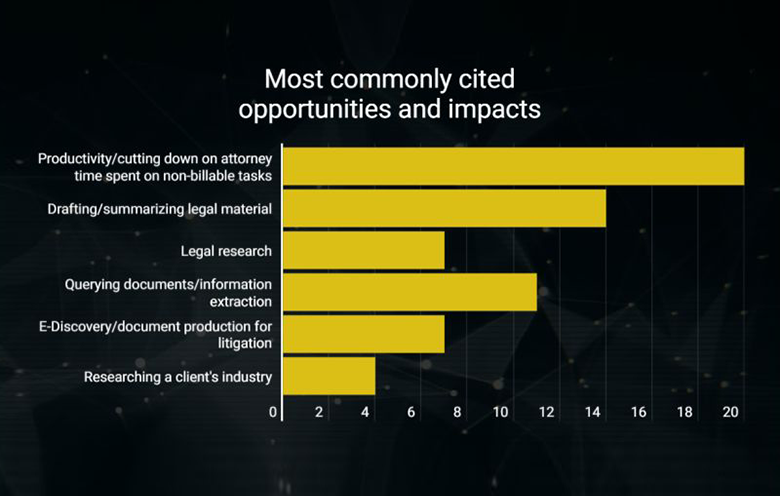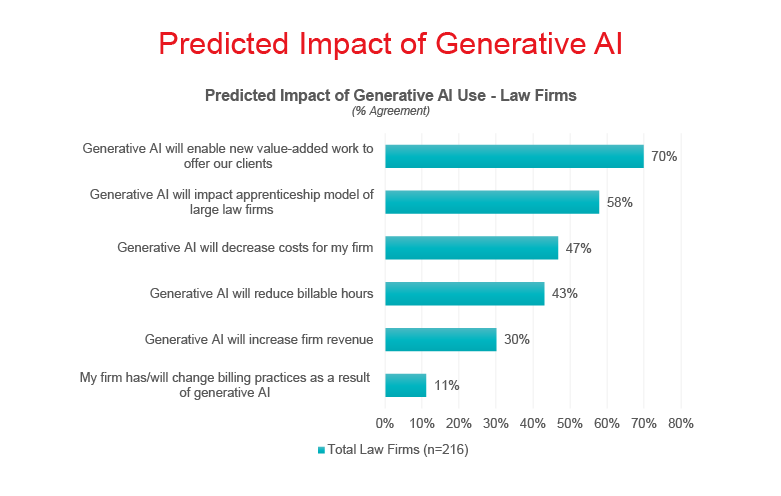Table of contents
- The challenges of traditional contract drafting
- How legal document automation with generative AI addresses these challenges
- Automate repetitive tasks
- Draft contracts efficiently
- Navigate the future with generative AI: A step-by-step guide for business implementation
- Template generation and customization
- Real-time collaboration and review
- Predictive analytics and risk management
- Efficiency in legal drafting and research
- Contract lifecycle management
- Key benefits of contract drafting with AI
- Real-life use cases of generative AI in the legal industry
- The future of generative AI in the legal industry
- Leverage legal document automation to achieve operational excellence
In the legal industry, contract drafting has long been a time-consuming and intricate task. Traditional methods often involve meticulous manual work, which increases the risk of human error and leads to high costs.
How much time do you spend manually renumbering paragraphs or re-entering client comments lost during copying and pasting?
How long does it take to perfect your document?
How much time it takes to refer to different documents and extract accurate information from those documents?
If you answered these questions with – too much or too long, you are not alone. Lawyers spend roughly 40-60% of their time drafting and reviewing contracts. The hassles of traditional methods are evident.
According to a study by the American Bar Association, AI-based document review can improve the speed and accuracy of document review by up to 90%.
This is where generative AI solutions come into play. GenAI-powered automated drafting and review free up substantial time, enabling law professionals to dedicate more attention to their cases.
In this blog, we will explore how generative AI helps with contract drafting, its benefits, and use cases.
The challenges of traditional contract drafting
Time-consuming non-billable hours: Drafting a comprehensive and legally sound contract demands significant time and effort. It often entails multiple rounds of revisions and consultations among legal teams and clients, prolonging the contract lifecycle.
Lack of standardization: Contracts drafted and reviewed manually are often inconsistent in language and clauses. Also, up-to-date versions of contracts are not easily accessible to the lawyers.
Risk of human errors: Manual drafting increases the vulnerability to errors such as omissions, inconsistencies, and inaccuracies. These errors can compromise the legal validity of contracts, potentially leading to disputes and legal liabilities.
High costs: The labor-intensive nature of traditional contract drafting translates into substantial financial expenditures. Law firms and their clients bear costs associated with prolonged drafting cycles, extensive review processes, and the need for specialized legal expertise.
Where traditional methods fail, generative AI solutions for the legal industry help address these issues. Let’s explore how the technology helps in detail.
How legal document automation with generative AI addresses these challenges

Source: LexisNexis
Automate repetitive tasks
Automate routine and repetitive tasks such as clause insertion, formatting, and renumbering of paragraphs. This reduces the manual workload on legal professionals, allowing them to focus on more complex aspects of contract drafting and other billable opportunities.
Draft contracts efficiently
NLP algorithms analyze and understand legal language, enabling AI systems to draft contracts that adhere to legal standards and best practices. This ensures the inclusion of all necessary clauses and provisions, reducing the risk of human errors and omissions.

Insights
Navigate the future with generative AI: A step-by-step guide for business implementation
Discover the benefits, understand the implementation process, and follow a detailed step-by-step guide to successfully integrate generative AI into your operations.
Template generation and customization
Create and customize contract templates based on specific legal requirements and client needs. This standardization ensures consistency across all contracts.
Real-time collaboration and review
AI facilitates real-time collaboration among legal teams, enabling multiple stakeholders to review and edit contracts simultaneously. This streamlines the review process, reduces delays, and enhances overall document production efficiency for litigation and other legal matters.
Explore the benefits of our robust generative AI framework, Needle!
Predictive analytics and risk management
AI tools use predictive analytics to foresee potential legal risks in the documentation and suggest preventive measures. By analyzing patterns and trends in legal data, AI helps in identifying and mitigating risks early in the drafting process.
Efficiency in legal drafting and research
Generative AI integrates AI legal research capabilities, allowing legal professionals to access comprehensive and up-to-date legal information quickly. This supports informed decision-making and ensures that contracts are aligned with current legal standards.
Contract lifecycle management
AI-powered contract lifecycle management (CLM) systems oversee the entire lifespan of a contract, from initial drafting to execution and renewal. These systems automate contract tracking, compliance monitoring, and deadline management. Moreover, it ensures that all contractual obligations are met. This reduces the risk of missed milestones or breaches.

Source: LAW.COM
Key benefits of contract drafting with AI
Enhanced accuracy and reduced errors: By automating repetitive tasks and leveraging pre-approved clauses, you can minimize the risk of human error.
Cost savings and resource optimization: AI reduces the time and resources needed for contract drafting, freeing up lawyers to focus on higher-value strategic tasks.
Expedited document production: Accelerate the drafting process by significantly reducing the time required to produce comprehensive legal documents. This leads to faster turnaround times and improved client satisfaction.
Improved client relationship: Enhance the overall client experience by providing accurate and timely legal documents. Clients benefit from faster service delivery and the assurance that their legal matters are handled with the utmost precision.
Suggested: 5 tips to implement generative AI in your organization
Real-life use cases of generative AI in the legal industry
Dechert LLP
Dechert LLP is a multinational American law firm with more than 900 lawyers. The company developed DechertMind, a proprietary suite of generative AI tools designed to transform law firm operations. Dechert LLP used their generative AI solutions for:
Automated contract drafting
Enhanced legal research
Improved document review
Client service optimization
Dentons
Dentons is the world’s largest global law firm by number of lawyers and the 6th-largest law firm by revenue. The company launched a client-secure version of ChatGPT to enhance client interactions and legal services. This solution offered them the following benefits:
Secure client communication
Efficient legal support
Legal AI assistant
Enhanced legal research
McGuireWoods
McGuireWoods was established in 1834 and is the largest law firm in the US. They embraced AI innovation through its partnership with Casetext Co-Counsel. The integration of generative AI in legal research ensures prompt resolution of client issues and facilitates the provision of accurate information for client documentation.
Enhanced legal research
Faster contract drafting
Improved operational efficiency
The future of generative AI in the legal industry

Source: LexisNexis
Integration with blockchain: Combining AI with blockchain technology can provide greater transparency and security in contract management.
Personalized contract templates: Generative AI will be capable of creating highly customized contract templates tailored to specific client needs and industry standards.
Enhanced predictive analytics: By analyzing vast amounts of data from previous cases and contracts, generative AI solutions will provide more accurate risk assessments and suggest preventive measures, aiding legal professionals in making more informed decisions.
AI-driven negotiation support: AI tools will assist in the negotiation phase by providing real-time suggestions and counterproposals based on historical data and legal precedents.
Increased adoption of generative AI in small and med-size legal firms: While large law firms are already embracing AI, the future will see increased adoption among small and medium-sized firms. As AI technology becomes more accessible and cost-effective, these firms will leverage generative AI to enhance their competitiveness and service offerings.
Efficiency in legal drafting and compliance: AI will play a critical role in ensuring authentication of legal documents. It will also ensure legal compliance by continuously monitoring regulatory changes and updating contract templates accordingly.
Leverage legal document automation to achieve operational excellence
As AI technology advances, it’s impact and adoption in the legal industry will see a significant growth. While many companies are utilizing generative AI for time-consuming task of contract drafting, the technology offers more opportunities. With AI-powered tools, law firms can gain a competitive advantage.
One notable example of such a tool is Needle, a generative AI framework developed by Softweb Solutions. Needle integrates seamlessly into legal workflows, providing robust AI capabilities for efficient contract drafting. To explore more benefits and use cases of our GenAI framework, contact our AI experts.

